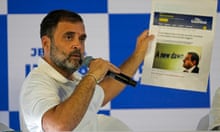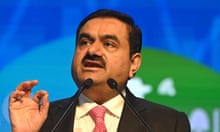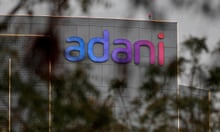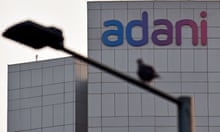The stock plunge engulfing Adani Group companies gathered pace on Thursday after the Indian conglomerate abandoned its share offer in an escalating crisis triggered by fraud claims that has cut more than US$100bn in value from the power-to-ports empire.
The conglomerate’s flagship listed company, Adani Enterprises, along with Adani Ports shed more than 10% before paring some losses in early trading in Mumbai. Some Adani bonds have plunged to distressed levels.
The relentless selling has triggered questions about how Adani, which runs Australia’s contentious Carmichael coalmine and rail project in Queensland, can stem the mounting losses and raised the prospect of forced asset sales.
One week after US-based Hindenburg Research accused Adani companies of stock manipulation and accounting fraud, the Indian group appeared to calm fears by completing a US$2.5bn share sale designed, in part, to pay off debt.
But renewed waves of selling this week at its listed companies, including Adani Enterprises which was running the fundraiser, meant participating investors would have suffered large and immediate losses should the sale have gone ahead.
“Given these extraordinary circumstances, the company’s board felt that going ahead with the issue will not be morally correct,” Adani said. “Once the market stabilises, we will review our capital market strategy.”
Adani initially completed the share sale with support from a prominent Abu Dhabi investor with ties to the royal family, along with investor support from within India.
The conglomerate, worth about US$220bn just one week ago before losing close to half of its value, has described Hindenburg’s report as a “calculated attack on India” in a charge denied by the US company.
The most dramatic claims made by Hindenburg, a US short seller that profits from falling share prices in the companies it targets, allege that Adani uses shell companies to manipulate the share prices of its listed ones.
Shells were also used to “launder” money into the listed company balance sheets, which help maintain the appearance of financial health and solvency, Hindenburg alleged.
Adani has denied the allegations and said any dealings with related parties were properly accounted for.
“The allegations and insinuations, which were presented as fact, spread like fire, wiping off a large amount of investor wealth and netting a profit for Hindenburg,” it said in a 413-page rebuttal of Hindenburg’s report. “The net result is that public investors lose and Hindenburg makes a windfall gain.”
Tim Buckley, a former investment banker and the managing director of Climate Energy Finance, said Adani’s avenues to raise money were severely curtailed given the serious allegations and subsequent share selldown.
“Capital markets in Europe and the US have effectively closed to Adani,” Buckley said. “Adani could sell a major asset to an ally and try and dress it up so it doesn’t look like a fire sale.”
In Australia Adani runs coal and rail operations in Queensland’s Galilee Basin, and holds a lease over the Abbot Point port terminal. The majority of its assets are in India, where it is the largest airport and private seaport owner.
Adani said the cancellation of the share sale would not have any impact on its existing operations or future plans. “Our balance sheet is very healthy with strong cash flows and secure assets, and we have an impeccable track record of servicing our debt,” it said.
Credit Suisse and Citigroup’s wealth arm are no longer accepting Adani bonds as collateral for margin loans, according to Bloomberg. This means the investment banks have cut the lending value of bonds issued by Adani companies to zero.
The intense selling pressure on Adani companies has hit the personal net worth of its billionaire chairman, Gautam Adani, whose wealth rivalled Jeff Bezos and Bill Gates just one week ago.
He has dropped out of the world’s 10 richest list, according to the Bloomberg billionaires index, and is also no longer the richest person in Asia, with the Indian petrochemicals tycoon Mukesh Ambani now boasting greater wealth.








